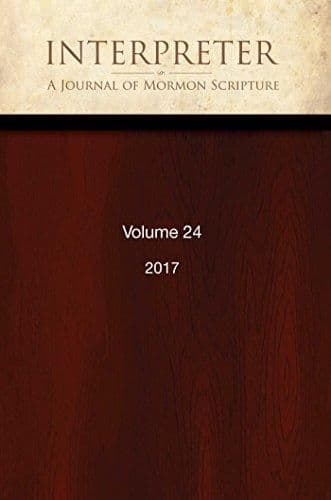Journal
Joseph Smith as a Book of Mormon Storyteller

Title
Joseph Smith as a Book of Mormon Storyteller
Publication Type
Journal Article
Year of Publication
2021
Authors
Hales, Brian C. (Primary)
Journal
Interpreter: A Journal of Latter-day Saint Faith and Scholarship
Pagination
253-290
Volume
46
Abstract
For nearly 200 years, skeptics have promoted different naturalistic explanations to describe how Joseph Smith generated all the words of the Book of Mormon. The more popular theories include plagiarism (e.g. of the Solomon Spaulding manuscript), collaboration (with Oliver Cowdery, Sidney Rigdon, etc.), mental illness (bipolar, dissociative, or narcissistic personality disorders) and automatic writing, also called “spirit writing, “trance writing,” or “channeling.” A fifth and currently the most popular theory posits that Joseph Smith possessed all the intellectual abilities needed to complete the task. A variation on this last explanation proposes that he used the methods of professional storytellers. For millennia, bards and minstrels have entertained their audiences with tales that extended over many hours and over several days. This article explores their techniques to assess whether Joseph Smith might have adopted such methodologies during the three-month dictation of the Book of Mormon. Through extensive fieldwork and research, the secrets of the Serbo-Croatian storytellers’ abilities to dictate polished stories in real time have been identified. Their technique, also found with modification among bards throughout the world, involves the memorization of formulaic language organized into formula systems in order to minimize the number of mental choices the tale-teller must make while wordsmithing each phrase. These formulas are evident in the meter, syntax, or lexical combinations employed in the storyteller’s sentences. Professional bards train for many years to learn the patterns and commit them to memory. When compared to Joseph Smith and the Book of Mormon, the historical record fails to support that he had trained in the use of formula systems prior to 1829 or that his dictation employed a rhythmic delivery of the phrases. Neither are formula patterns detected in the printed 1830 Book of Mormon. Apparently, Smith did not adopt this traditional storyteller’s methodology to dictate the Book of Mormon.
Subject Keywords
Bibliographic Citation
Terms of use
Items in the BMC Archive are made publicly available for non-commercial, private use. Inclusion within the BMC Archive does not imply endorsement. Items do not represent the official views of The Church of Jesus Christ of Latter-day Saints or of Book of Mormon Central.